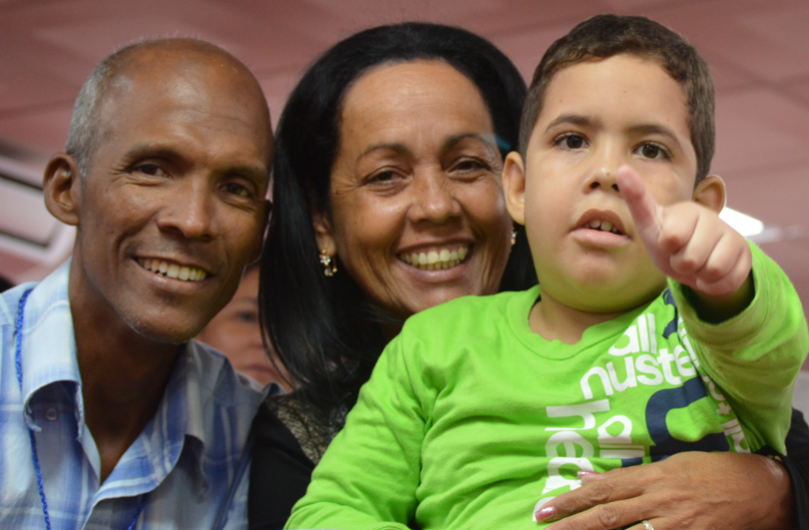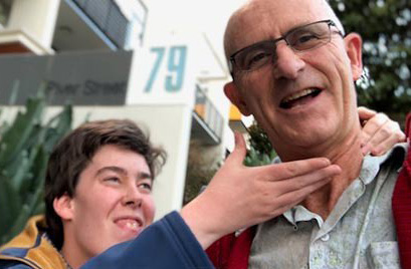Promoting Positive Behaviour
Some people with Prader-Willi syndrome (PWS) engage in inappropriate behaviour from time to time. This varies from person to person and can cause problems for the person with PWS, their families and the community. It also has the potential to limit opportunities to socialise with friends and isolate or cause embarrassment for members of the family. What is inappropriate behaviour? This article is concentrating on behaviour that is not causing any direct physical harm but is not generally acceptable in a public place or at the specific location where it is occurring. It is generally the type of behaviour that would cause discomfort or embarrassment to those around the person at the time and is likely to draw unwanted attention to the person exhibiting the behaviour and those around them such as family members or friends. It is also behaviour that would not usually be a problem in private place or in a different context and it varies depending on the location and situation. It can also depend on the culture of the people that are around and therefore there is a level of social competence needed to assess what would be acceptable at any given place and time.
Some examples include:
• Talking in the movies and yelling at the characters on screen
• Making negative comments about another person such as members of the public while they are there
• Loudly complaining about having to wait your turn, for example in a queue or waiting room
• Eating discarded food, eating too quickly or eating without using the appropriate utensils
• Invading personal space, being overfriendly or running into others
• Asking inappropriate personal questions of people they may or may not know
• Skin picking or touching various parts of their own body in public
• Staring at members of the public
Why do people with PWS engage in inappropriate behaviour?
People with PWS have a number of underlying issues that could cause them to have inappropriate behaviour. Firstly, most people with PWS have difficulties with picking up on social cues because what we find normal, demands a normally maturing brain and empathy. Therefore, understanding that someone else may have a difference in perspective may be impossible for someone with PWS. We must remember not to expect more or blame someone for not having this capacity. They tend to take things literally and often miss subtle clues that others may be uncomfortable with what they are doing or saying. They often do not realise that others people have different values to them and often forget that children or the elderly may have issues of their own that make them less able to understand what is happening. So even though people with PWS, may not feel that they have to obey rules or social norms themselves, they can be less accepting if other people don’t obey the rules that they know. They may not understand that things that are acceptable in one place, such as talking in front of a TV in their own room, are not acceptable in another location such as yelling at the movies. Guidelines concerning appropriate behaviour must be original taught and regularly reinforced.
Secondly, people with PWS can be more anxious or may feel that they will miss out on something if they have to wait. If this occurs they can become overwhelmed and can disregard the rules around taking turns. They may push past someone else, despite having been taught not to, make unreasonable demands of shop assistants or say things that cross their mind that other people would find irritating such as stating loudly ‘that man is taking forever I wish he would hurry up and move’. In addition their fixation on routine can cause them to react to even small delays or changes to plans.
Finally, people with PWS are known to have a constant drive to eat and are often fixated on food. This can cause issues in public as they may eat too quickly and disregard table manners or spill food on themselves. They could also eat items that they find or eat something after they drop it on ground, which bystanders may find repulsive.
What should you do when a person with PWS is doing something that is inappropriate?
These are simple and practical strategies that help to minimise the impact of the meltdown:
• Remain calm and think about what you are going to say before you say anything. Remember that although the behaviour that they are engaging in, is irritating, it is not causing anyone any great danger and the behaviour is due to PWS, not because the person wants to irritate you. You want to avoid doing anything that will escalate the situation into something that is more dangerous. How you react will depend on the person you are dealing with and your own knowledge of the way that the person usually reacts to things that you say to them.
• Gentle prompts can be useful without showing too much emotion. Let them know that you understand why they are doing what they are doing. Then explain the problems that they are causing for themselves, those around them, and for you. Ask them politely to stop. For example you could say, ‘I can see that you are frustrated that the assistant is serving someone else and you really want him to serve you next. But if you yell at him, it will distract him from serving others and you will then have to wait longer. Please stop yelling and I am sure he will serve us as soon as he can.’ You want to them understand what you are saying, not just react to your tone of voice.
• Praising them for displaying appropriate behaviour, when you can see that they wanted to behave inappropriately and didn’t, by saying ‘I am very happy with you because I could see that you were frustrated because you had to wait, and did so patiently, without saying anything’.
• Distraction is also a useful strategy: simply having a conversation or talking about things may stop the behaviour, as the person is too busy talking to you to keep behaving inappropriately. Focussing on an upcoming event can distract the person from things that are happening at the time. You could also bring a game, puzzle or book to an appointment. Chewing sugar-free gum is a good stress reliever and distraction.
• Preparing the person for the event and explaining what is happening can also be useful. For example, as you enter a busy medical centre you could explain ‘everyone here is sick and in a hurry to see the doctor so we need to make sure that we aren’t too loud and that we wait our turn. The doctor needs to spend time with each person to make sure they are helped. The doctor will then spend time with you.
• Planning is everything, so if you know in advance that there is likely to be a problem, addressing it with the person with PWS beforehand can help. For example, before going to the movies you could explain the expected behaviour and the consequences of not following it, which could be that you may not be able to take them anymore or that the movie attendant could ask you to leave.
• Making rules that apply at home can also be a useful strategy. For example, if table manners are always followed regardless of whether you are at home eating a sandwich or having dinner with friends in a restaurant, there is less likelihood of inappropriate behaviour in public places. However, this may be more difficult to enforce if the whole family is not on board with following the same rules. Likewise, respecting personal space at home, within reason, or using polite language at home can help with managing it in public.
• Setting an example or addressing the issue when it is not happening by use of a personal story is very helpful. For example, you could tell the person with PWS about a time when you had to wait and how frustrated you felt. Then explain that you wanted to yell out at the other people, but didn’t and explain why you didn’t. It’s helpful to give an example of what you did, rather than what you didn’t do.
• Planning in advance to gain a reward that is not food can also be useful. For example, you could agree to go to the shops to buy something specific eg a coffee, if they can demonstrate patience, polite behaviour and conversation
Below are some examples and strategies that parents and carers have found successful in dealing with inappropriate behaviours:
One parent writes: My daughter likes to approach mothers with young babies. She offers to hold them or look after them; or sometimes she just stares at them. It must make the mothers feel uncomfortable, so when she is with me I always catch her attention and mention under my breath that she is staring. Generally she accepts this and is very amenable to being distracted because babies and small children put her in an excellent frame of mind. On other occasions, if she sees something happening that she thinks is reprehensible (for example, a dog with a collar that’s too tight; a child being told off in public; an inconsiderate driver) she has been known to verbally apprehend the owner of the dog or child’s parent. To the offending driver, she has simply bellowed out the car window. It’s an ongoing thing as she is never likely to change her personality, but she does (generally) respond to being gently told that this is not the best way to behave. She’ll argue the point, of course, but that’s just her.
Avoiding inappropriate or disruptive acted out by people with PWS is not always possible, but addressing it as soon as possible, with calmness and known-to-be-successful strategies can minimize and manage the situation promptly It is the sharing of these strategies with all people involved in the life of your person with PWS that is the key. Share what you know works best for your person with PWS, and enlightens others!
Blind Rage (contributed by Dr Janice Forster)
PWS is known for hyperphagia and temper outbursts. Researchers have discovered that temper tantrums precede the typical food related behaviors in early childhood. For all children, including those who have PWS, tantrums occur when the reward centers of the brain begin to mature. The reward center enables all children to learn from experience and to form expectations about things that happen in their world. When a child wants something and does not get it, a tantrum occurs. Or, when something occurs that is different from what the child is expecting, a tantrum occurs. Among children who have PWS, this tantrum behavior differs from typical children in two important ways:
- It is more intense.
- The biochemical braking system to stop the tantrum is broken.*
Each tantrum is unique to the child, but in PWS it is usually very quick in onset and may appear to occur out of the blue. If one looks carefully at the antecedents of the situation from the perspective of the child, often the etiology can be determined. Once a tantrum begins, there is nothing that can be done to stop it, other than to keep everyone and everything in the environment safe. The tantrum will run its course. After the tantrum is over, some children will be exhausted and require a nap. Other children will get back on track fairly quickly and resume their daily activities; they may or may not acknowledge their behavior.
The cortex of the brain not only governs reward, but it is responsible for thinking and reasoning behavior. Another part of the brain is involved in behaviors such as tantrums and shut downs. The amygdala directs brain mechanisms associated with survival (fight, flight or freeze); it is responsible for emotional expression, aggression, and impulsivity. For this reason, the cortex has been referred to as the ‘baby sitter’ of the amygdala. Although neural connections to the reward center of the cortex begin around age two, the thinking and reasoning behavior is slower to mature in typical children and takes even longer to develop in children with PWS. Using the analogy of a computer, when a child has a full-blown tantrum, their thinking and reasoning ability in the cortex goes “off-line”. This is why children with PWS appear to be in a ‘blind rage” during the tantrum; they are literally behaving in survival mode, acting without thinking. In PWS it takes a while for the brain to “reboot.” After they recover, they may act as if nothing has happened (brain reboot), and they may or may not remember what has occurred.
A tantrum is a learning experience for the caregiver. The keys to successful behavioral management are determining what the trigger is, redesigning the daily plan to avoid it, and developing coping strategies to deal more effectively with it.
GABA (gamma-aminobutyric acid) is the major inhibitory neurotransmitter in the brain; it regulates muscle tone and provides the braking mechanism for behavior, allowing a person to “stop and think” before acting. GABA receptors are reduced in PWS, resulting in decreased GABA action in the brain that may also contribute to epilepsy, anxiety disorders and depression.
*GABA (gamma-aminobutyric acid) is the major inhibitory neurotransmitter in the brain; it regulates muscle tone and provides the braking mechanism for behavior, allowing a person to “stop and think” before acting. GABA receptors are reduced in PWS, resulting in decreased GABA action in the brain that may also contribute to epilepsy, anxiety disorders and depression.
This article was written by IPWSO’s Famcare Board.
International Community
IPWSO was established so that PWS associations, families, clinicians and caregivers around the world could exchange information and support and have a united global voice under one umbrella.
Information for Medical Professionals
The latest medical and scientific research and information, plus guides into common medical issues affecting people with PWS.



